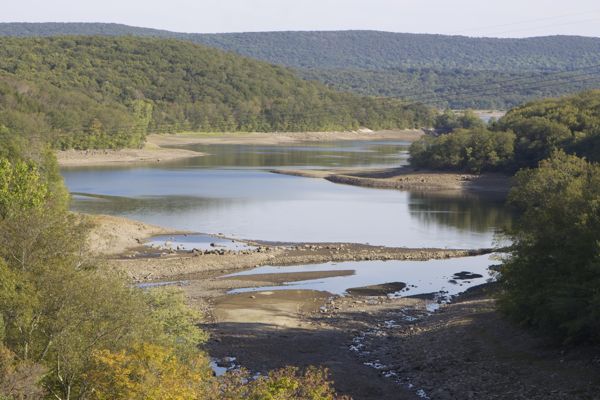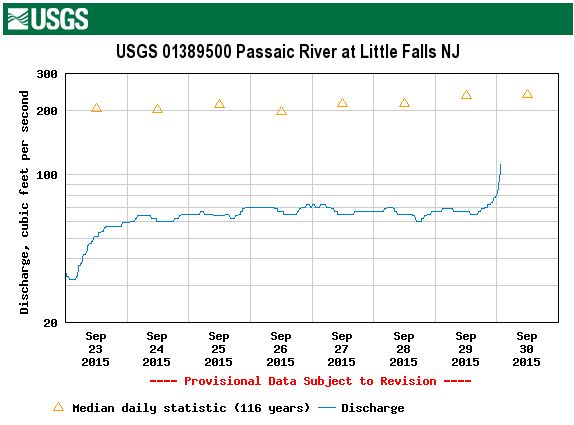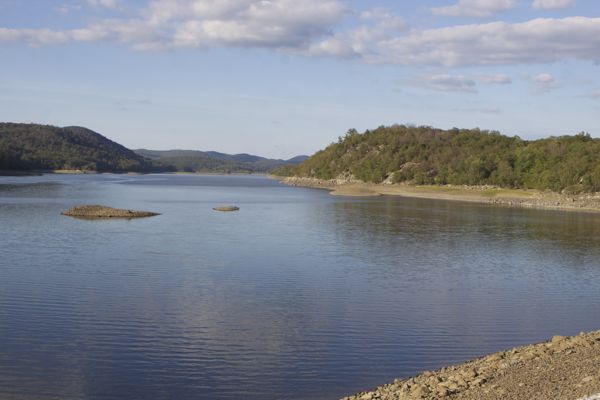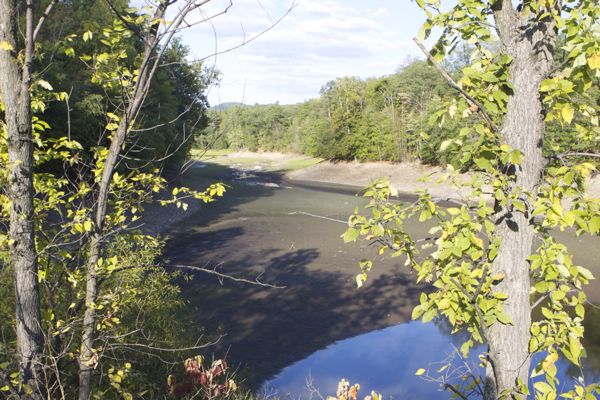Christie DEP Covering Up Reasons for Publishing Faulty Drought Data
DEP denies public records request for explanation DEP provided to Advisory Council
[Update #2 – Acting State Geologist Hoffman made a presentation to the Water Supply Advisory Council today about the “mix up” with respect to drought data. It boils down to a complex statistical methods issue involving precipitation data. This led to misleading reporting. No big deal in the sense that is was a legitimate technical error. The briefing expanded upon the memo I filed an OPRA for.]
Update #1: 9/30/15 – Jim O’Neill at the Record finally gets it half right on the flow issue – as I noted, the Passaic basin flows were critically low.
But he continues to ignore the water quality issue – ironically in today’s story about rainfall making everything OK:
The North Jersey District Water Supply Commission, which operates the reservoir, can refill it when levels drop by using pump stations on the Pompton and Ramapo rivers. The state prohibits the commission from pumping water out of the rivers during July and August, because of concern that flows are too low. The commission pumped water out of the Pompton through much of September, and was sending 50 million to 95 million gallons a day of river water into the Wanaque Reservoir.
But because flows in the Pompton, Ramapo and Passaic had become so low in recent days, the commission was forced under state regulations to stop pumping, said commission spokesman William Maer.
Once again, though, O’Neill doest get it quite right. The flows in the Passaic “in recent days” are actually HIGHER that they were on September 6 – 9, when I raised the issue! see:
My guess is that the cessation of pumping is what explains the increase in flows on 9/23 –
Yes, once again, we are lurching from drought to flood ~~~ end update]
As the summer’s lack of rainfall persisted into the fall and drought worsened, some private water companies issued water conservation advisories.
So people were scratching their heads asking why DEP refused to declare a drought watch, and the news media began to ask questions and write stories.
I posted criticisms of the Bergen Record’s coverage, noting errors and omissions in river flow and water quality data.
Stephen Stirling of the Star Ledger (NJ Advance media) took that criticism one step further and discovered that DEP had published and relied on faulty data.
On September 11, 2015, he wrote a scathingly critical story:
No drought about it, DEP published faulty rainfall data
Everyone except the New Jersey Department of Environmental Protection seemed to know that mounting precipitation deficits were becoming a problem for New Jersey’s most populous region.
By several measures of the National Weather Service and the New Jersey State Climatologist, precipitation deficits in northeastern New Jersey, prior to Thursday’s rains, were operating between four and six inches below average. The U.S. Drought Monitor, a national collective of academics, placed northeastern New Jersey in a “moderate drought” designation. United Water, which provides water to more than 800,000, called for voluntarily water restrictions after its reservoirs fell to about 45 percent of capacity, following a scorching and dry August.
But visit the DEP’s drought monitoring site, and a different story is being told:
The agency’s drought monitoring site has stated that precipitation, reservoir and ground water levels all remain near or above normal.
But for an undetermined amount of time, an analytical error has led the state agency to use and publish erroneous information about the state’s water situation, a topic that affects virtually every facet of life in New Jersey, from farming to day-to-day residential water usage.
Obviously, DEP was embarrassed by the error. I imagine Commissioner Martin was very angry too.
At some point, I am not clear how, this news story became a concern of the NJ Water Supply Advisory Council (WSAC). The Council is an advisory body to the DEP Commissioner. It has no formal powers.
The controversy led to the unusual last minute cancellation of the September WSAC meeting.
I attend Water Supply Advisory Council meetings and am on their email distribution list.
Typically, not much of substance is discussed on those emails, except for the scheduling of meetings. So I was stunned to get an email from DEP to WSAC members on 9/17/15 that highlighted an explanation of the technical error in the news story drought data. DEP wrote:
Assistant Commissioner Dan Kennedy expressed his desire to attend this meeting; unfortunately, a schedule conflict precludes his availability tomorrow. His preference is that he and other key staff are available at the meeting to discuss condition status, changing conditions and next steps. DEP anticipates fully explaining at this WSAC meeting its system for monitoring water-supply conditions and deciding on appropriate status in each drought region (in the interim, you should have received an email from Steve Doughty providing a drought condition update and brief explanation of the precipitation indicator mix-up).
That email revelation was like putting a red flag in front of a bull.
Obviously, I was very curious about this DEP “mix up” and immediately filed an OPRA requesting the Steve Doughty DEP email on 9/18/15.
DEP OPRA Denial
Yesterday (9/28/15) DEP denied my OPRA public records request.
The DEP’s denial has seriously negative implications for transparency at scores of advisory bodies to state government, and sets a very bad precedent under OPRA. It must be challenged.
DEP denied the OPRA request for the following reasons:
The requested September 16, 2015 email from Steve Doughty to the Water Supply Advisory Council members is an intra-agency advisory and deliberative record. This record is being withheld on the basis that the requested record is not considered a government records pursuant to N.J.S.A. 47:1A-1.1.
DEP’s denial is obviously an attempt to cover up their embarrassing “mix up”.
The basis for denial – intra-agency advisory and deliberative record – is false and blatantly illegal, for the following reasons:
1. The author of the email, Steve Doughty, is an administrative assistant, not a policymaker. Doughty does not make decisions or participate in management decision-making.
2. The email was factual and explanatory of technical information – facts can not be withheld under OPRA.
3. The email was from the DEP, the decision making body who deliberates on policy, to the WSAC.
It is arguable that a recommendation from the WSAC to the DEP Commission could be considered deliberative, but it is absurd to argue that a technical email from a low level DEP employee to WSAC is deliberative.
4. There was no “deliberation” because there was no decision pending. The DEP email was explanatory of decisions made and actions already taken by DEP
5. The WSAC is not a decision-making body so the DEP memo can not be deliberative. There is nothing to deliberate.
6. There are private sector members of the WSAC. Those private members routinely share WSAC with their corporate colleagues. They are under no confidentiality or secrecy restrictions on material provided to them from DEP.
There also is a “public” representative on the WSAC that should provide this kind of information to the public (ahem….). I should not have to file an OPRA for it. WSAC is not some top secret entity.
The public deserves the same information that DEP provides to private water companies.
7. The WSAC also has private sector water companies on it, so the DEP memo can not be an intra-governmental record.
This is little more than petty bureaucratic ass covering that can not be allowed to stand.
It sets a horrible precedent under OPRA – we’re looking for lawyers willing to take this case. It is a high probability win and OPRA provides for full reimbursement of attorney’s fees, plus costs.



